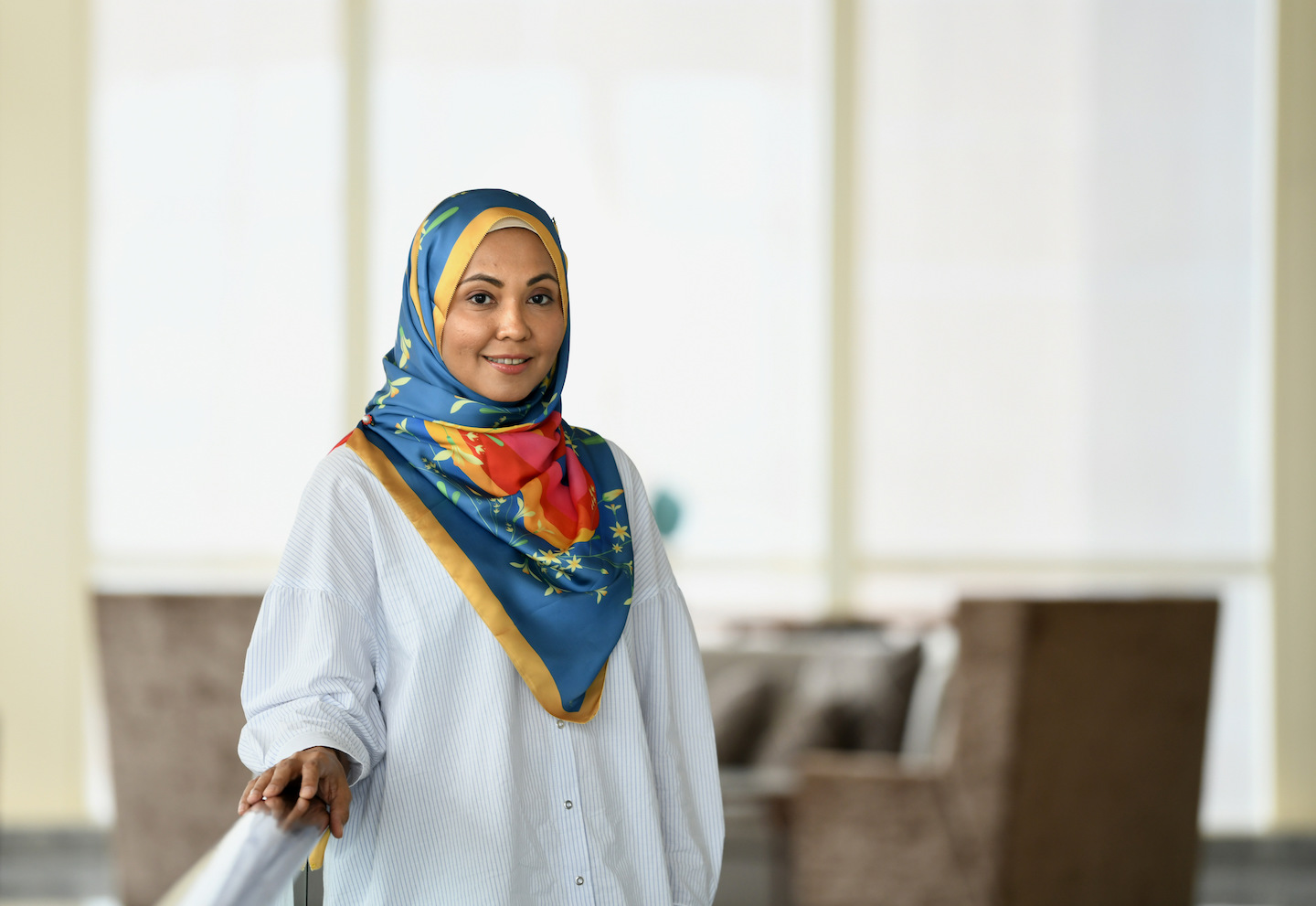
Nadira is also the chairperson of the Economic Development and Entrepreneurship Committee, an affiliate of the National Council of Women’s Organisations Malaysia (Photo: Mohd Izwan/The Edge Malaysia)
Necessity is the mother of invention, a saying especially well suited to Nadira Yusoff and her journey of founding babysitting mobile platform Kiddocare. Set up in response to her own challenges in finding quality childcare as she pursued her career in entrepreneurship and technology, Kiddocare allows parents to arrange well-trained, on-demand carers for their children.
The idea for it came to Nadira three years before she could put it in place. As the chairperson of the Economic Development and Entrepreneurship Committee, an affiliate of the National Council of Women’s Organisations Malaysia, she was heading the Malaysian women entrepreneurs’ community under the umbrella of the Asean Women Entrepreneurs Network.
“A main thrust of that initiative was to get more women back into tech-related careers. But in doing that, I noted a lack of support for women when it came to childcare,” she recalls. “As a parent to four young children, this was something I could relate to personally. Traditional systems do not always support the needs of working mums with more punishing working hours. The idea for Kiddocare lay dormant in my head for a while, as I wasn’t sure that Malaysians were ready for the idea of booking a babysitter or welcoming a stranger into their homes to care for their child.”
Traditionally, the responsibility of childcare falls on parents or other family members and it would take a substantial mindset shift to introduce the idea of a trained, paid carer, Nadira knew. So, she waited. “The world has evolved, and we acknowledge these days that grandparents may not even want to be full-time carers at this stage in their lives. We are having kids at later ages, so our parents are older too,” she observes. “As an entrepreneur, I know what it’s like to launch something the market isn’t ready for. So, I sat on the idea for a long time before launching in 2018, on International Women’s Day itself.”
kiddocare.jpeg

Launched as a pilot project in its first year, Kiddocare is a web-based support ecosystem for parents, using technology to match and connect them with trained babysitters when they are required. Because Nadira and her team are all parents as well, the service is considered from all the angles that a parent would look at — safety, reliability and professionalism. “We created Kiddocare to add value to the lives of parents and their children. The work we put in is our gift to our clients — from parents to parents,” she adds in earnest.
As a working mother, Nadira shares her experiences relating to the pressures of having to achieve a work-life balance, managing a career and a family, as well as carving out ‘me’ time. But while its importance is universally acknowledged, what’s less clear is how this can be achieved.
“You cannot talk about flexible working hours and building entrepreneurial skills without addressing this most important thing — helping working mothers with their most important job, which is caring for their young. Conventional childcare systems cannot support that.”
Kiddocare’s two-pronged approach helps both mothers who need the assistance as well as those seeking work, as many have signed up as carers themselves. “It’s a win-win, as we are pairing women who need work with women who need help. But we need to do it right, which is how technology fits into the equation,” Nadira says. What she means by this is that all bookings are managed on Kiddocare’s website, and technology also aids training, monitoring and follow-ups.
When they launched, there were more carers than parents asking for help — so that pilot period was crucial for Nadira and her team to iron out some market concerns. “The idea of a stranger coming into your homes was new, so all their concerns were very valid. Our carers are put through stringent background police checks, to start with. They are all local, and given extensive training. We have SOPs to ensure carers provide hourly updates on how the child is doing, and that’s how we use tech to engender trust.
“There is also an additional aspect of comfort, as the child remains in the safety of her own home. So, parents are free to install a camera, if they wish. These are issues that many parents had, but once they were clarified, the business started to really take off.”
Kiddocare’s rates are accessible, from RM60 for two hours and up to RM230 for a 12-hour period per child, and scale up based on the number of children. Bookings can be made on the easily navigable website, where you can view the profile of your child’s potential carer as well. Payment is made electronically upon confirmation, and admin staff carefully monitor the entire experience, from the time the carer leaves their own homes to the time their job is completed. “Safety is on two sides,” Nadirah says. “Bear in mind, the carers are also spending a lot of time in a stranger’s home, so our emphasis is to ensure both child and minder are safe and well.”
The company has about 1,500 carers in the Klang Valley thus far. Owing to the pandemic, Nadira’s plans to expand Kiddocare to other parts of the nation, where demand has started to soar, have had to be put on hold. What Covid-19 did however accelerate was digital-aided training, which was previously done only in real life — the Kiddocare Academy was introduced recently, which allows potential carers outside the Klang Valley to start their training ahead of the company’s national expansion. At the academy, carers can also map out their career progression — remain as a part time nanny, pursue entrepreneurial opportunities in this space or even consider a career with special needs children.
After a bumper 2020 — Kiddocare worked with many medical frontliners and essential workers, for example, and helped mothers who struggled with adjusting to working from home — Nadirah is mapping out the company’s future. This includes partnerships with corporate organisations as work-from-home arrangement continues, expansion plans and building the capacity of the existing community of carers. “I hope this platform will become a vehicle not just to empower parents, but also to economically empower our women carers,” she says passionately. “This is the ecosystem that we are trying to build.”
This article first appeared on Mar 8, 2021 in The Edge Malaysia.


